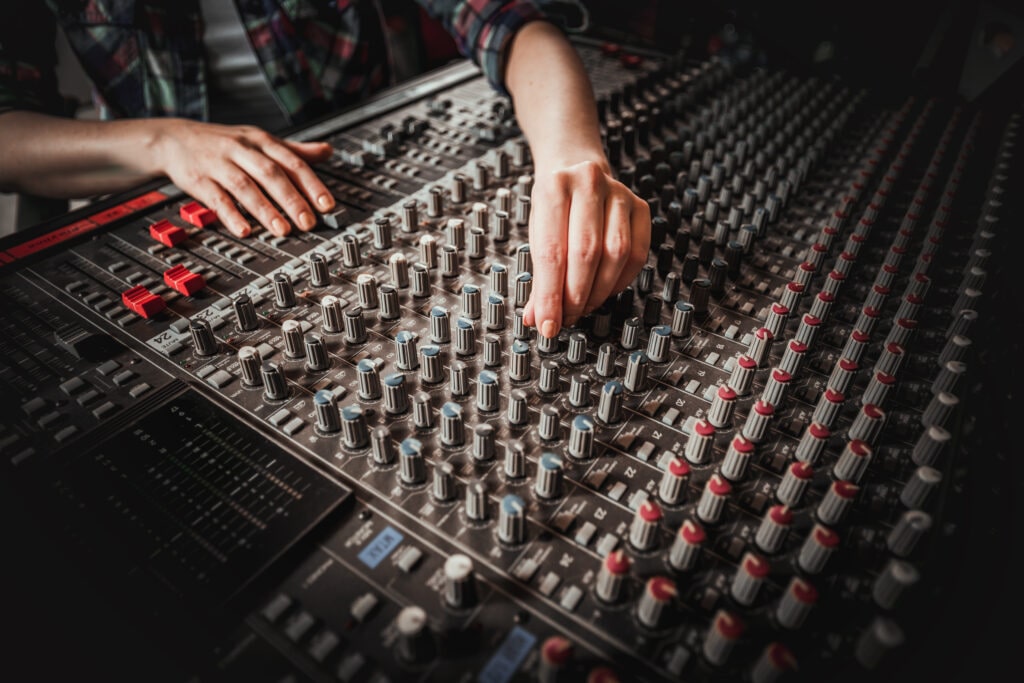Audio Engineering: The Art and Science of Sound

What is Audio Engineering?
Definition and Scope
Audio engineering is the science and art of capturing, manipulating, and enhancing sound. It involves the technical aspects of sound recording, mixing, and mastering, using specialized equipment and software. Audio engineers work in various industries, including music, film, live events, and broadcasting.
Key Roles of an Audio Engineer
An audio engineer is responsible for ensuring that sound recordings meet high standards of quality. They use their technical expertise to operate equipment, mix tracks, and troubleshoot any audio-related issues that arise. In short, they’re the bridge between creative ideas and the polished final product.
Core Aspects of Audio Engineering
Recording
The recording process is the foundation of Access the cast-a-blast.com site. It involves capturing sound using microphones, mixers, and audio interfaces. An audio engineer ensures the best possible capture of vocals, instruments, and sound effects by considering elements like acoustics, microphone placement, and signal flow.
Mixing
Once recording is done, the audio engineer moves on to mixing, where they balance and manipulate all the tracks. They adjust levels, panning, EQ, and apply effects to create a cohesive sound. Mixing is about making sure each element has its place in the song and doesn’t overwhelm the others.
Mastering
Mastering is the final stage of audio engineering. After mixing, the engineer takes the final mix and ensures that it’s polished and ready for distribution. This process involves fine-tuning the overall sound to make sure it translates well across all devices, from high-end stereo systems to tiny earbuds.
Sound Design
Sound design is another key part of audio engineering, especially for film, television, and video games. It involves creating custom sound effects, atmospheres, and unique sonic elements that enhance the viewer or listener’s experience.
The Audio Engineering Process
Pre-Production and Planning
In the pre-production phase, audio engineers plan the technical aspects of a project. This could include choosing the right microphones, setting up the recording space, and understanding the creative direction of the project. Effective planning is crucial for smooth recordings.
Tracking and Recording
Tracking refers to the process of recording individual elements of a song or soundscape. Whether it’s a vocal performance, guitar riff, or sound effect, the goal is to capture high-quality audio that can later be manipulated and mixed.
Mixing and Post-Production
Once all the tracks are recorded, the audio engineer moves on to mixing. This involves organizing and balancing the tracks to create the desired sound. Post-production refers to editing, adding effects, and making adjustments to ensure the audio is ready for mastering.
Mastering and Finalizing the Track
Mastering is the final step, where the track is enhanced and formatted for release. This includes adjusting the overall EQ, adding compression, and ensuring the audio is compatible with various listening platforms.
Essential Tools for Audio Engineers
Microphones and Audio Interfaces
Microphones capture the sound, while audio interfaces convert it into a digital format for recording and processing. A high-quality microphone is essential for capturing clear and detailed sound.
Digital Audio Workstations (DAWs)
DAWs like Pro Tools, Logic Pro, and Ableton Live are the primary tools for audio engineers. These software programs allow them to record, edit, mix, and master music or sound projects.
Headphones and Studio Monitors
Accurate listening is essential in audio engineering, and this is where headphones and studio monitors come in. Studio monitors provide a flat frequency response, ensuring engineers can hear every detail of the mix, while headphones are often used for detailed listening during tracking and editing.
Plugins and Effects
Plugins are software tools that enhance audio in various ways, such as EQ, reverb, compression, and other effects. They are integral to the mixing and mastering process and give audio engineers more creative freedom.
The Role of Audio Engineers in Different Environments
In Studio Engineering
In the studio, audio engineers work on recording, mixing, and producing music, sound effects, and other audio projects. They ensure the technical aspects of the recording are top-notch and collaborate with producers and artists to achieve the desired sound.
Live Sound Engineering
Live sound engineers work in concert venues, theaters, and event spaces, where they control the audio mix during live performances. They manage microphones, speakers, and mixing boards to ensure the sound is balanced and clear for the audience.
Broadcast and Film Audio Engineering
Audio engineers in film and broadcasting focus on ensuring that sound effects, dialogue, and music are properly mixed and synced with the visuals. This requires precision and attention to detail, especially when it comes to sound design and creating an immersive audio experience.
Skills Required for a Career in Audio Engineering
Technical Knowledge
A successful audio engineer must understand the technical aspects of sound equipment, acoustics, and signal flow. Knowledge of digital audio software and hardware is essential.
Creative Problem Solving
Sometimes, issues arise during recording or mixing that require creative solutions. Audio engineers must be able to think outside the box to fix problems and improve the sound.
Attention to Detail
Audio engineering requires an ear for subtle differences. Engineers must be able to identify even the smallest imperfections and adjust them to ensure a clean, professional final product.
Challenges in Audio Engineering
Dealing with Acoustic Issues
Acoustic problems, such as sound reflection or background noise, are common challenges faced by audio engineers. These issues can affect the quality of recordings and require solutions like soundproofing or equipment adjustment.
Technical Failures
From broken microphones to faulty cables, technical failures can interrupt a recording session. Audio engineers need to be prepared to troubleshoot and fix problems quickly.
Working Under Pressure
Audio engineers often work under tight deadlines, especially in live sound or film production. This pressure can make the job stressful but also exciting.
The Future of Audio Engineering
The Impact of Digital Technology
Digital technology has revolutionized audio engineering, making it easier and more affordable for people to record and produce high-quality sound. The availability of advanced software and equipment continues to evolve, opening up new creative possibilities.
Automation and AI in Audio Engineering
Artificial intelligence and automation are starting to play a role in audio engineering, from auto-mixing to AI-generated sound effects. These technologies may enhance the creative process, but human expertise will always be crucial in achieving the perfect sound.
Conclusion
Audio engineering is both an art and a science, requiring technical knowledge, creativity, and attention to detail. Whether you’re working in a studio, on a live performance, or in film and broadcast, audio engineers are the unsung heroes behind the soundtracks of our lives. With new technologies continuing to shape the field, audio engineering will only continue to evolve, offering exciting opportunities for those passionate about sound.



